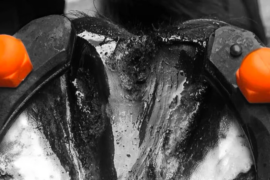“Only five types of chemical drugs are available to treat horses in the UK for worms and there is now evidence of resistance to all of these chemicals…”
We all know that worming horses can be confusing, but it’s now more important than ever to ensure we are worming effectively by testing first to slow resistance. Keep reading to find out what the professionals from BHS & BEVA recommend.
The ‘Think before you worm’ scheme educates equestrians on the importance of following an evidence-based, testing-led, deworming programme. The British Horse Society (BHS), in collaboration with the British Equine Veterinary Association (BEVA), has launched a new campaign to help slow the rate of anthelmintic resistance, also commonly referred to as wormer resistance.
Gabby Madders, Welfare Campaigns Officer at The British Horse Society said: “If we continuously deworm our horses without testing first, the number of resistant worms present will increase. This means worms on the horse’s pasture will become resistant to dewormers and no longer respond to treatment.
Only five types of chemical drugs are available to treat horses in the UK for worms and there is now evidence of resistance to all of these chemicals. Without action, we could reach a point in the future where all worms are resistant to the dewormers available, which will be disastrous for equine welfare.
We’re delighted to be working with BEVA to minimise the threat of resistance and to support horse owners, carers and yard managers with the development of a tailored, testing-led deworming plan that prioritises the welfare of their horses and eliminates any unnecessary treatment.”
The outdated practice of giving dewormers at regular intervals, without testing first, has resulted in worms becoming resistant to many of the drugs that we use. The campaign is urging people to seriously consider reducing their horse’s exposure to unnecessary dewormers by using testing-led programmes.
If worms become resistant to all drugs, horses are at risk of serious diseases such as colic, weight loss and anaemia which may ultimately result in fatalities. To slow down resistance horse owners are urged to:
- Follow an evidence-based, testing-led deworming programme
- Conduct annual Faecal Worm egg count reduction testing (FWECRT)
- Prioritise good pasture management to reduce our reliance on treatments.
Types of worms and their correct treatments:
Small Redworm
It is recommended that you conduct egg count tests between March/April for small redworm – if your horse’s egg count comes back high then you should look into administering a wormer, we can advise you once you receive the results from your R&R Country Worm Count Test Kit. If your results are low you should continue and take another worm count in approx. 12 weeks time.
Tapeworm
Although usually tested for and treated (if necessary) in Autumn, tapeworm should also be considered and tested for twice a year in medium to high-risk horses. You can test for tapeworm by carrying out a saliva test.
Encysted Redworm
Encysted redworm needs to be considered during the Winter months. If you have any questions on the control of encysted redworm, we recommend contacting one of our friendly SQPs for advise, as encysted redworm cannot be tested for.
Test/Treat
Many horses will not have the burden of worms and will not require treatment, but it is imperative to have the tests done to establish if there is a worm issue present in the first instance. Worm counting, combined with saliva tests for tapeworm, can stop unnecessary worming and limit the resistance some parasites will develop to the chemicals in the wormers.
If you need any advice, please contact our friendly team to discuss a worming programme that will suit you and your horse’s needs.

Sources:
BHS,2022: https://www.bhs.org.uk/about-us/latest-news/think-before-you-worm-scheme-launched/
BHS,2022:





